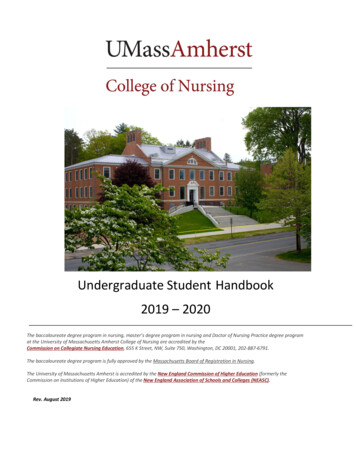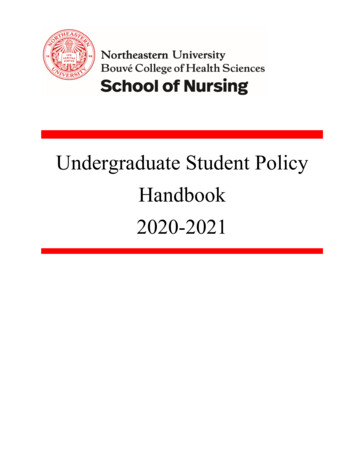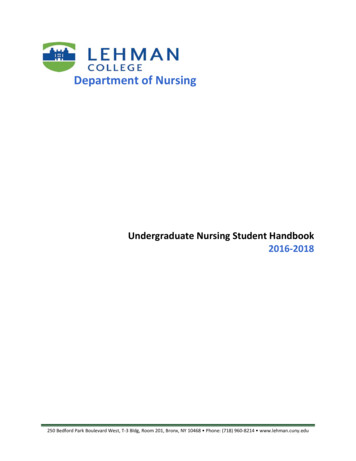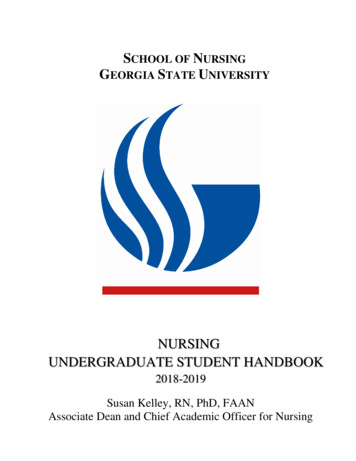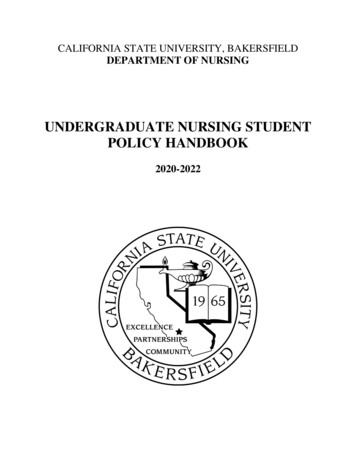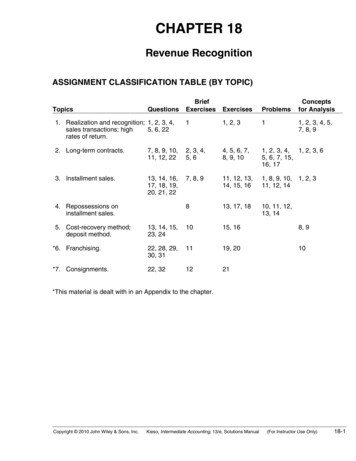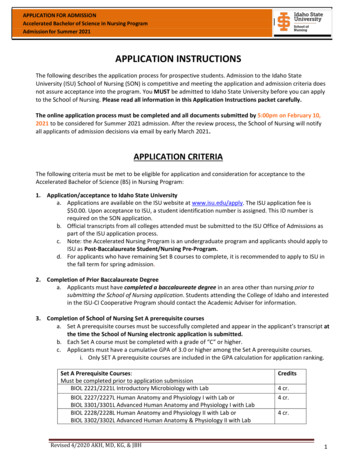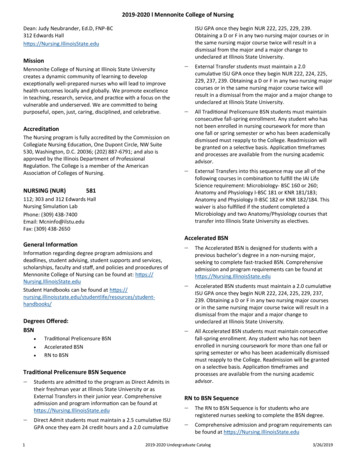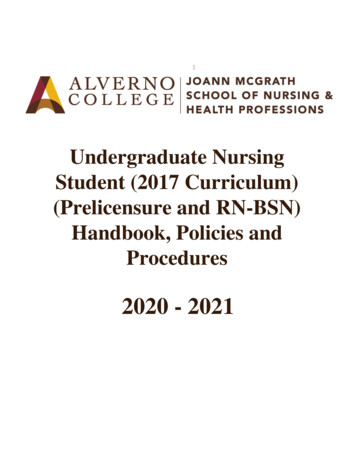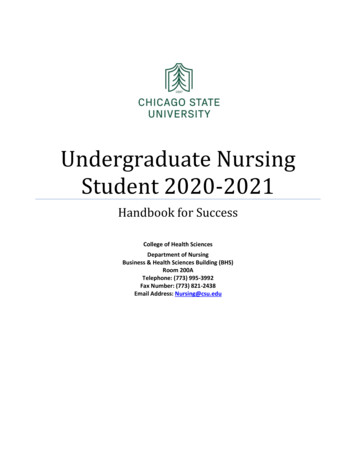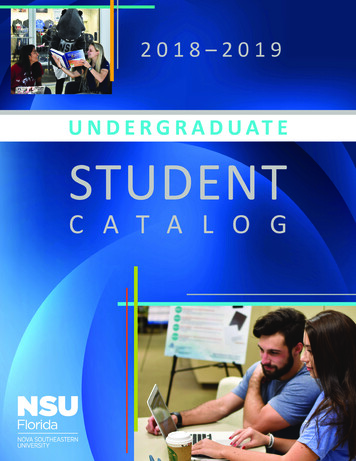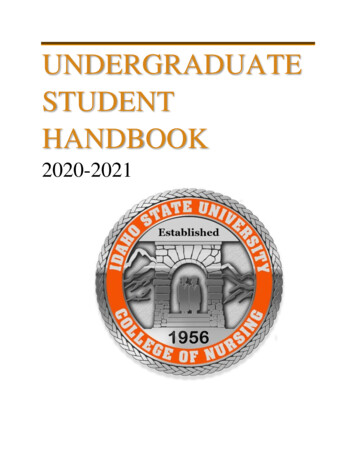
Transcription
UNDERGRADUATESTUDENTHANDBOOK2020-2021
2IDAHO STATE UNIVERSITYCOLLEGE OF NURSINGUNDERGRADUATE NURSING STUDENT HANDBOOKTABLE OF CONTENTSUndergraduate Program OverviewTraditional ProgramAccelerated ProgramBS Completion ProgramMission of UniversityCollege of Nursing VisionCollege of Nursing Mission StatementCollege of Nursing PhilosophyIncivility in Academia555666667Undergraduate Program Outcomes8Core AttributesCritical ThinkingLeadershipTechnological CompetenceEffective CommunicationPopulation Based HealthProfessional BehaviorClinical Practice8-11899991011Aggregate Level Outcomes11-15Progression of Students in the Undergraduate Nursing ProgramMinimum Grade for CoursesGrading ScaleIncomplete GradeWithdrawal/Dismissal IssuesAcademic DismissalViolation of Code of Professional Conduct DismissalPersonal WithdrawalMilitary WithdrawalApplication Process for ReadmissionReadmission CriteriaAcademic DismissalViolation of Code of Professional Conduct DismissalPersonal WithdrawalMilitary WithdrawalProcess for ReadmissionWaiver of Course and/or Deviation from Published Curriculum16-2016161617171717171718181818181819
3Independent Study CoursesPlan of Study and Graduation Review2020Student Responsibilities in the ISU College of NursingContact InformationAccess to Computer and InternetStudent Review of Personal Permanent FileMalpractice InsuranceNursing Lab CoursesStandards of ConfidentialityAffiliating AgenciesTransportation to Clinical AgenciesDress CodeName BadgesFaculty Supervision of Students in Nursing Lab Course during Off-HoursPreceptor Learning EnvironmentsWriting Criteria for College of Nursing20-2521212121212122222224242425Code of Professional ConductUnprofessional BehaviorLevel I and II InfractionsConsequences of Unprofessional BehaviorSexual Misconduct/Harassment in External Lab Site25-3126262831Resolution of Student Issues32-33Academic DishonestyConsequences for Academic Dishonesty at the CON LevelConsequences for Academic Dishonesty at the Division LevelConsequences for Academic Dishonesty at the University LevelRestitution of Scholarship Funds33-3534343535Faculty Advisors for StudentsStudent AdvisingFaculty Class Advisor353535Student OrganizationsISU Student Nurses AssociationClass Representatives – Traditional ProgramClass Officers – Accelerated ProgramMeetings35-3835363738Student Loan and Scholarship ProgramsFinancial AidScholarship Opportunities383838
4Health Status RequirementsHealth EvaluationCommunicable DiseaseTuberculosis (TB) ScreeningImmunization Status38-4339393939Safety and Protection AssurancesCriminal Background ChecksCardio Pulmonary Resuscitation (CPR)Effective CommunicationBloodborne Pathogen Exposure Control43-5043444445Licensure ExaminationNational Council of Licensure Examination - NCLEX-RN Preparation5151Idaho State University Resources51References52AppendicesAppendix AAppendix BAppendix CAppendix DAppendix EAppendix FAppendix GAppendix HAppendix IAppendix J53-715354545556575859-636465-66Incomplete CourseworkCollege of Nursing Course PetitionUniversity Student PetitionIndependent Study ContractConfidentiality AgreementCode of Professional ConductWritten Record of Student Violation of Code of Professional ConductBloodborne Pathogen Exposure Control FormsDeclination Form for Seasonal Influenza VaccineConfidentiality Understanding and Consent and Release for SimulationExperiencesAppendix K Annual Follow-up Tuberculosis Health Questionnaire for PreviousPositive Skin TestAppendix L CON Student Drug Testing PolicyAppendix M Receipt of UG Student HandbookAppendix N CON Formal Complaint Policy6768-697071-72
5IDAHO STATE UNIVERSITYCOLLEGE OF NURSINGAll students enrolled in the College of Nursing (CON) are subject to the policies and proceduresof Idaho State University (ISU). Students are responsible to review the ISU UndergraduateCatalog and the ISU Undergraduate Student Handbook. These documents are available online.The Undergraduate Nursing Student Handbook is an official communication of the policies andprocedures for the College of Nursing.Undergraduate Program OverviewThe Bachelor of Science (BS) with a Major in Nursing degree is a critical first step for a careerin professional nursing. The American Association of Colleges of Nursing (AACN), the nationalvoice for baccalaureate and graduate nursing programs, recognizes the baccalaureate degree asthe minimum educational requirement for a professional nursing practice. Nurse executives,federal agencies, the military, leading nursing organizations, health care foundations, communityhospitals, public health agencies and minority nurse advocacy groups all recognize the uniquevalue that baccalaureate-prepared nurses bring to the practice setting. A nurse with abaccalaureate degree is well-prepared to meet the demands placed on professional nurses intoday's society. Baccalaureate prepared nurses from Idaho State University are recognized fortheir skills in communication, critical thinking, professionalism, leadership, and healthpromotion. As graduates of the Idaho State University College of Nursing, graduates are fullyprepared to practice across a variety of inpatient, outpatient and community settings. The IdahoState University College of Nursing offers three undergraduate degree options which include theTraditional baccalaureate program, the Accelerated program, and the BS completion program.Traditional Baccalaureate ProgramThe Traditional Baccalaureate Degree is well-suited to students with no prior nursing experiencewho are seeking their first degree in nursing. The Traditional program provides learningopportunities for undergraduate students in a variety of classroom and clinical settings to preparestudents to take the National Council Licensure Examination Registered Nurse (NCLEX-RN) tosecure licensure as a professional nurse. Earning a Baccalaureate degree (BS) with a major inNursing from Idaho State University requires students to earn 120 credits which are completedover a minimum of four years. Students take general education and nursing prerequisite coursestheir first two years at the university. Then students must apply and be accepted into thebaccalaureate nursing program to complete their program of study.Accelerated ProgramThe ISU-Meridian Accelerated Nursing undergraduate degree is offered to individuals who havea bachelor's degree in another discipline and wish to make a career change. This program isthree semesters in length and admits students every summer semester. The Accelerated programprovides learning opportunities for undergraduate students in a variety of classroom and clinicalsettings to prepare students to take the National Council Licensure ExaminationRegistered Nurse (NCLEX-RN) to secure licensure as a professional nurse.
6Bachelor of Science (BS) Completion ProgramThe BS Completion Program for Associate Degree Registered Nurses is available for registerednurses who want to continue their education to obtain a baccalaureate degree. The BSCompletion Program offers unique opportunities for associate degree nurses with expansiveknowledge and skills to function at the baccalaureate degree level. Each student must earn aminimum of 120 credits to graduate from Idaho State University. An individualized program ofstudy is developed for each student when they are accepted to the BS Completion Program.Mission of /index.shtmlCollege of Nursing VisionTo be an internationally renowned college of nursing sought out by those who are committed tolifelong inquiry for improving the health of diverse populations.College of Nursing Mission StatementTo prepare caring, exemplary nurse leaders who integrate education, service, and scholarship,through practice and research, to enhance the quality of life for rural and diverse populations.College of Nursing PhilosophyThe faculty in the College of Nursing subscribe to a common philosophy about human beings,nursing, and nursing education that encompasses both the undergraduate and graduate programs.Faculty strives to be leaders and visionaries in their role as nurse educators, and advocates forconsumers of health care, and health professionals. Humans are dynamic, holistic, andmultidimensional. They have intrinsic worth and needs which are uniquely experienced andexpressed within the totality of their environment. The manner in which an individual’s needsare met influences the individuals’, families’, and community’s growth and developmentthroughout the life cycle. Humans have the right and the responsibility for their health and wellbeing. Moreover, they have the right to access basic health services for promotion andmaintenance of a wellness state, and treatment of acute or chronic illness. To this end, thefaculty recognizes a responsibility to sanction access for health care through educational,leadership, political, and public service activities.Education is a community responsibility shared by recipients and providers of health care,students, and faculty. The faculty is committed to creativity in the learning process andcontinuous quality improvement in curriculum and program development. Faculty facilitates theeducative process, promotes an environment for effective application of nursing knowledge,stimulates critical thinking, and role model professionalism. As learning is a lifelong process,students are active participants in their education and are accountable for developing personaland professional knowledge. Professional nursing is educative, facilitative, and caring.Professional nursing practice is grounded in sound scientific and humanistic knowledge formedfrom a complex and diverse field of study. Furthermore, nursing practice is a collaborativeendeavor, which promotes health and wellness in a variety of ways and settings. Nursesadminister healing arts; assist the terminally ill to die with dignity and physical, emotional, and
7psychological comfort; and support families through normative and tragic transitions.Professional nurses use decision-making, teaching learning, research, therapeuticcommunication, problem solving, and critical thinking processes in the provision of services.Utilization of nursing knowledge is the major focus in the undergraduate curriculum in thedevelopment of beginning level practitioners.The undergraduate program prepares graduates to meet the present and emergent public healthconcerns at local, regional, and global levels. Throughout the development of the professionalrole, students learn to view the recipients of nursing care as individuals, families, groups, orcommunities within cultural and environmental contexts. The population distribution andgeographical nature of Idaho mandates that graduates be able to practice competently in urban,rural and frontier nursing settings.Graduate education is built upon undergraduate education. Students are prepared to assumeadvance practice roles by developing nursing knowledge through research, theory, and practice.At the graduate level, faculty and students contribute toward the application and elaboration ofnursing theories to describe, explain, predict and understand nursing phenomena. Graduateeducation facilitates learning environments where students can construct their own knowledgeintegration at an advanced level. Advanced practice nurses develop broad based knowledge andexperience to facilitate or deliver personalized, holistic health care to clients over the lifespan ina variety of settings with emphasis on rural practice.Incivility in AcademiaIncluded in our program is the need to maintain a civil mannerism. At the ISU CON, our goal isto assist and provide an atmosphere that fosters civility and a desire for education. Ourexpectation is that each participant, including faculty, students, and staff will radiate acceptanceof all diverse populations, in every setting. Civil behavior is respectful, communicative,visionary, and a progression to a common goal. Faculty and students will maintain high level ofcivility and create an atmosphere conducive to higher levels of critical thinking, scholarlyadvancement, and compassion.Ways students can maintain civility are:1) Respect all individuals;2) Courtesy and promote “Goodwill”;3) Include everyone in activities and utilize inter-professional collaborative approaches;4) Communicate;5) Establish a sense of humility and fairness in activities;6) Strive to achieve high-quality goals for community, university, class, and self;7) Try not to internalize when faced with incivility; forgive, and move on.Inappropriate behaviors may include:Sleeping in classChallenging faculty in class settingsLeaving class earlyRude commentsImproper use of cellphonesEngaging in conversations while instructor is speakingThreatening activityUnprepared for classDominating classDemonstrating bored or apathetic attitudes
8Undergraduate Program OutcomesCompletion of the undergraduate program provides the graduate with the abilities to:1. Evaluate critical thinking skills based upon nursing knowledge integration, the sciencesand the humanities, in planning direct and indirect care for diverse populations in rural orurban settings.2. Develop individual traits and personal power to interact constructively with clients,families and communities.3. Evaluate the broad range of technology requirements.4. Create effective communication with clients, families, communities and other health careproviders using verbal, non-verbal, electronic and/or written modalities.5. Evaluate the principles of population health needs.6. Value behaviors congruent with current standards of professional practice, and promotethe nursing profession.7. Appraise basic nursing science information and develop expertise in the comprehensivecare of clients, families, and communities.Core AttributesThe faculty support nursing education that assures the development of knowledge, skills, andjudgment. This is accomplished via classroom and online learning opportunities, computerizedenhanced simulation and direct client care experiences and community-based screening andeducational events. The nursing profession demands that nurses have knowledge, skills andjudgment to be able to work collaboratively as part of an interdisciplinary team which includesthe client, family, community, and other health care professionals. Baccalaureate preparednurses from ISU are recognized for their skills in critical thinking, population health, leadership,professionalism, communication, clinical practice, and technical competence. Graduates arefully prepared to practice across a variety of inpatient, outpatient and community settings.Students are expected to actively participate in a structured program of learning focused ondeveloping affective, behavioral, cognitive and psychomotor skills to assure safe care for clientsand community.Seven core attributes have been developed to guide each student to successful completion of theprogram. These attributes include:1. Critical Thinking2. Leadership3. Technological Competence4. Effective Communication5. Population Based Health6. Professional Behavior7. Clinical PracticeCritical thinking is the use of skills and abilities to make decisions based on the process ofactively and skillfully conceptualizing, applying, analyzing, synthesizing, or evaluating to solveproblems. Critical Thinking involves gathering data by observation, experience, reflection,reasoning or communication as a guide to belief or action. In nursing, critical thinking is used tosolve problems by incorporating evidence-based practice and research findings in evaluatingeffective strategies for the delivery of quality care (Scriven and Paul, 1987).
9The key concepts essential for the development of critical thinking include inquiry,analysis, critical and creative thinking; methods for evaluating health resource literature;evidence-based practice; nursing research process and ethical conduct in research;knowledge integration with integration of knowledge and practice; and ability to problemsolve and make decisions.Leadership is the ability to use individual traits and personal power to interact constructivelywith clients, families and communities; to guide interdisciplinary groups to solve healthcareproblems; and to build relationships and work with partners to empower others to set and achieverealistic goals. Inherent to leadership is the notion that the process requires adaptation along theway as environmental changes occur and new knowledge emerges.The key concepts essential for development of leadership abilities include understandingof health care finance; the ability to create an environment of inclusion, teamwork, interprofessional understanding and interdisciplinary collaboration; health care policy;regulatory issues; legal issues; quality improvement with understanding of workflow andprocess improvement; safety and systems analysis.Technological competence includes the understanding of a broad range of technologyrequirements which are needed for nurses in today’s complex society. These technologiesencompass both advances in health care science and health information technology which willresult in increased client care options and a greater demand for management of health careinformation.The key concepts essential for the development of technological competence includeemergent computer, virtual and medical technologies and information technology.Effective communication is the ability to exchange information between individuals with theuse of verbal, non-verbal, written and electronic communication strategies. Use of effectivecommunication strategies enable students to facilitate professional and therapeutic relationshipswith peers, faculty, staff, clients, families, communities, and other health care professionals.Confirmation of effective communication involves demonstration of understanding throughverbal, non-verbal, written and electronic responses by the recipient(s).The key concepts essential for the development of effective communication includeadvocacy, client education, collaboration, information literacy, human interface andhealth literacy.Population based health encompasses several broad categories. The population health needsinclude the ability to develop partnerships to work effectively to provide health promotion, riskreduction and disease prevention education, screening and surveillance services for clients,families, communities and other health care professionals. The goal of health promotion is toassist individuals, families and communities to achieve optimal levels of health and well-being.The key concepts essential for the promotion of the health of individuals and populationsinclude health promotion, risk reduction and disease prevention with interventionsappropriate to primary, secondary and tertiary levels of health; community-based care;families; gerontology; health disparities; mental health and care of individuals withaddictions; poverty; underserved populations; end-of-life issues; nature of a globalsociety; human growth and development; complementary and alternative therapies;
10cultural assessment awareness; and sensitivity; inter-professional and communitycollaboration; and prevention (primary, secondary, and tertiary).Professional behavior includes a broad range of intellectual and emotional skills and abilitieswhich allow the student to fully engage and experience the expectations of professional nursingpractice. Students will demonstrate professional behaviors in all settings throughout the nursingprogram. The American Nurses Association Standards of Practice have been used to develop theISU College of Nursing standards for professional behavior.The student will:1. Accept responsibility for one’s own actions and attitudes.2. Demonstrate the ability to develop and maintain therapeutic relationships and appropriatepersonal boundaries.3. Demonstrate a respectful, sensitive, and non-judgmental manner when communicatingwith others. In
The ISU-Meridian Accelerated Nursing undergraduate degree is offered to individuals who have a bachelor's degree in another discipline and wish to make a career change. This program is three semesters in length and admits students every summer semester. The Accelerated program
